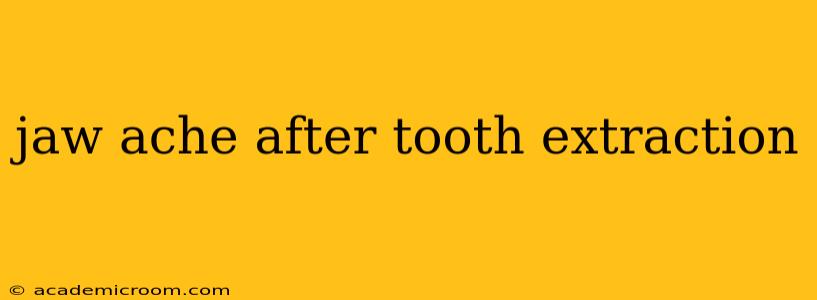Experiencing jaw ache after a tooth extraction is a common occurrence, often stemming from the surgical procedure itself and the body's natural healing process. While some discomfort is expected, persistent or severe pain warrants attention. This comprehensive guide will explore the causes of jaw ache post-extraction, effective treatment options, and preventative measures to minimize discomfort.
What Causes Jaw Ache After Tooth Extraction?
Several factors contribute to jaw pain following a tooth extraction. Understanding these causes is crucial for effective management.
-
Surgical Trauma: The extraction process, especially for impacted or complex extractions, can cause direct trauma to the jawbone and surrounding tissues. This trauma leads to inflammation and pain.
-
Dry Socket: This painful complication occurs when the blood clot protecting the extraction site dislodges or dissolves prematurely. The exposed bone is then vulnerable to infection and intense pain, often radiating to the jaw.
-
Inflammation: The body's natural inflammatory response to the extraction site can lead to swelling and pain in the jaw area. This is a normal part of healing, but excessive inflammation can cause significant discomfort.
-
Infection: Although less common with proper post-operative care, infection at the extraction site can cause severe jaw pain and other symptoms like fever and swelling.
-
Referred Pain: Pain from the extraction site can sometimes be referred to other areas of the jaw, causing seemingly unrelated discomfort.
-
Sinus Issues (Upper Teeth Extractions): Extractions of upper teeth, particularly molars, can sometimes affect the maxillary sinus, leading to sinus pain that feels like jaw pain.
-
Temporomandibular Joint (TMJ) Dysfunction: Pre-existing TMJ disorders can be aggravated by the extraction process, resulting in increased jaw pain.
How Long Does Jaw Ache After Tooth Extraction Last?
The duration of jaw pain varies depending on the complexity of the extraction, individual healing rates, and the presence of complications. Mild discomfort typically subsides within a few days, while more significant pain might persist for a week or longer. If the pain worsens or lasts longer than a week, consult your dentist immediately.
What Can I Do to Relieve Jaw Ache After Tooth Extraction?
Several home remedies and medical treatments can alleviate jaw ache:
-
Over-the-Counter Pain Relievers: Ibuprofen or acetaminophen can effectively manage mild to moderate pain. Always follow the recommended dosage.
-
Ice Packs: Applying ice packs to the affected area for 15-20 minutes at a time can reduce swelling and inflammation.
-
Rest: Avoid strenuous activities and get plenty of rest to promote healing.
-
Saltwater Rinses: Gentle rinsing with warm saltwater can help keep the extraction site clean and prevent infection.
-
Prescription Medications: In cases of severe pain or infection, your dentist may prescribe stronger pain relievers or antibiotics.
How to Prevent Jaw Ache After Tooth Extraction?
While some jaw ache is inevitable, you can take steps to minimize discomfort:
-
Follow Your Dentist's Instructions: Adhering to post-operative instructions regarding medication, diet, and oral hygiene is crucial.
-
Maintain Good Oral Hygiene: Brush and floss gently around the extraction site, avoiding direct contact with the area.
-
Eat Soft Foods: Stick to soft foods for the first few days to avoid irritating the healing tissue.
-
Avoid Smoking and Alcohol: These substances can hinder healing and increase the risk of complications.
-
Proper Hydration: Staying well-hydrated helps with the healing process.
Is Jaw Ache After Tooth Extraction Normal?
Yes, some degree of jaw ache is considered normal after a tooth extraction. However, severe, persistent pain, swelling, or other concerning symptoms require immediate dental attention.
When Should I Call My Dentist About Jaw Ache After Tooth Extraction?
Contact your dentist if:
- Your pain is severe and doesn't respond to over-the-counter pain relievers.
- You experience excessive bleeding or swelling.
- You develop a fever or other signs of infection.
- You notice any unusual changes at the extraction site.
This information is for educational purposes only and should not be considered medical advice. Always consult with your dentist or oral surgeon for diagnosis and treatment of any oral health concerns. They can provide personalized recommendations based on your specific situation.
